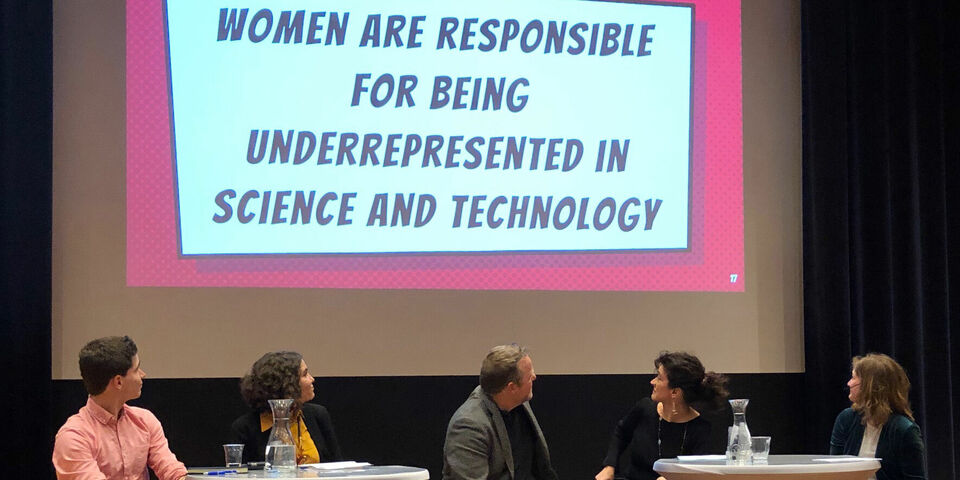Super scientists m/f: challenging the standard
There are no ready-made solutions for the small number of women working in the field of technology. That much was clear during Superpowers of M/F Scientists, Wednesday evening in the Blauwe Zaal. Stereotypes about successful scientists are persistent. "We have to challenge the standard," said panel member Wijnand IJsselsteijn.
Ruth van Veelen conducts research at the University of Utrecht concerning social identity and diversity in academia and in the technology sector. She spoke about her research at the invitation of Studium Generale and Tint.
A female ... professor?
And here Van Veelen immediately had a point: “We think in terms of stereotypes; cognitive shortcuts that we need to understand the world. But at the same time they are also barriers for women in academia, for example. Because apparently that does not belong to women, being a scientist."
Panel member professor Wijnand IJsselsteijn had a good example: “My wife (TU/e professor Yvonne de Kort, ed.) was helping at our children's primary school once and the children asked what her job was. When she said she is a professor, they didn't want to believe it. Because a woman, professor - that's not possible!"
Dropping out
Among students, the number of men and women in technology is about the same, but with every step higher up the academic ladder, more women drop out. At the TU/e, for example, only 12.6 percent of professors are women. One of the reasons for this is the stereotypes that rule the tech world, Van Veelen argues. “In the technology sector in the Netherlands, only thirteen percent of employees are women. The Netherlands is really dangling at the bottom. In our country, it is implicitly believed that men are better at tech than women.” This comment elicits “It's embarrassing!” from someone in the audience.
A study that Van Veelen conducted among more than four thousand Dutch researchers shows that male stereotypes dominate the image of a successful scientist. Men are seen as agentic - competitive and result-oriented - and women as communal, with which the terms ‘caring, warm and modest’ are associated.
When asked which characteristics are more important for a "super scientist", agentic scored highest. At the same time, most of the scientists who completed the survey considered themselves higher in the communal properties - this applied to both men and women. "Women think you should be more agentic," says Van Veelen. She calls this a lack of fit, which is felt primarily by women early in their career and ensures that they leave the academic world faster.
Solutions
What could be solutions? According to Van Veelen, it is important that people are aware of negative gender stereotypes to begin with. She does not believe in separate programs to solve the ‘lack-of-female-scientists-problem’: "Be careful not to overdo it. Make sure you create an environment that is good for men, women, internationals; everyone."
Moderator Bert Meijer, university professor and working at Chemical Engineering, endorses this: “I believe it is very important to have a good gender balance within our university. We have to work hard on that. But I do not believe in setting quota to attract more women. If only a limited number of positions are available, you are then discriminating against the men again.”
Not belonging
Someone in the audience mentioned that awareness is very important. Van Veelen: “That's right, but there must immediately be a feeling that something is being done about it. Awareness alone gives women the feeling of not belonging."
The lecture was followed by a panel discussion with - besides Van Veelen - TU/e's Chief Diversity Officer Evangelia Demerouti, professor Wijnand IJsselsteijn and students Ana Xambre Pereira and Hugo Bezombes. Various topics were discussed together with the audience.
IJsselsteijn argued that our university needs more diversity in opinion. "Here the products of the future are made, you cannot leave that to a small part of society alone." Demerouti said she was a bit frustrated after listening to Van Veelen’s story. “I always pretend that there are no gender issues. The fact is that we all have to step out of our comfort zone a little."
Common grounds
Ana Xambre Pereira said she hoped to find common grounds. “It's not about men or women, it's about people.” Van Veelen added: “Talking about gender diversity is always a bit threatening, both for men and women. It’s about professional diversity to which everyone can contribute. I hope that the discussion will ultimately shift to that area."
Meijer closed the evening by asking how long we still have for this discussion. Demerouti is pessimistic, when Van Veelen calls out the year 2040. Student Bezombes thinks that two generations are needed to straighten it out, and student Ana Xambre Pereira also thinks it needs about another twenty years. Professor IJsselsteijn hopes that the discussion will never disappear: "It is so useful to keep talking to each other about this."







Discussion